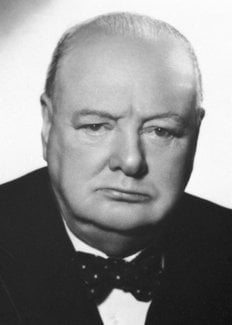Winston Churchill
Biographical

The Right Honourable Sir Winston Leonard Spencer Churchill (1874-1965), the son of Lord Randolph Churchill and his American wife Jennie Jerome, was educated at Harrow and Sandhurst. After a brief but eventful career in the army, he became a Conservative Member of Parliament in 1900. He held many high posts in Liberal and Conservative governments during the first three decades of the century. At the outbreak of the Second World War, he was appointed First Lord of the Admiralty – a post which he had earlier held from 1911 to 1915. In May, 1940, he became Prime Minister and Minister of Defence and remained in office until 1945. He took over the premiership again in the Conservative victory of 1951 and resigned in 1955. However, he remained a Member of Parliament until the general election of 1964, when he did not seek re-election. Queen Elizabeth II conferred on Churchill the dignity of Knighthood and invested him with the insignia of the Order of the Garter in 1953. Among the other countless honours and decorations he received, special mention should be made of the honorary citizenship of the United States which President Kennedy conferred on him in 1963.
Churchill’s literary career began with campaign reports: The Story of the Malakand Field Force (1898) and The River War (1899), an account of the campaign in the Sudan and the Battle of Omdurman. In 1900, he published his only novel, Savrola, and, six years later, his first major work, the biography of his father, Lord Randolph Churchill. His other famous biography, the life of his great ancestor, the Duke of Marlborough, was published in four volumes between 1933 and 1938. Churchill’s history of the First World War appeared in four volumes under the title of The World Crisis (1923-29); his memoirs of the Second World War ran to six volumes (1948-1953/54). After his retirement from office, Churchill wrote a History of the English-speaking Peoples (4 vols., 1956-58). His magnificent oratory survives in a dozen volumes of speeches, among them The Unrelenting Struggle (1942), The Dawn of Liberation (1945), and Victory (1946).
Churchill, a gifted amateur painter, wrote Painting as a Pastime (1948). An autobiographical account of his youth, My Early Life, appeared in 1930.
This autobiography/biography was written at the time of the award and first published in the book series Les Prix Nobel. It was later edited and republished in Nobel Lectures. To cite this document, always state the source as shown above.
Winston Churchill died on January 24, 1965.
Nobel Prizes and laureates
Six prizes were awarded for achievements that have conferred the greatest benefit to humankind. The 12 laureates' work and discoveries range from proteins' structures and machine learning to fighting for a world free of nuclear weapons.
See them all presented here.
